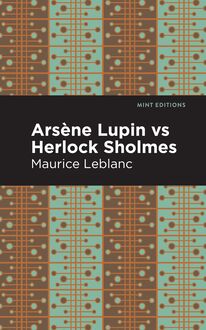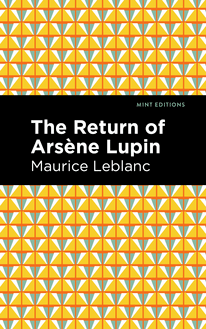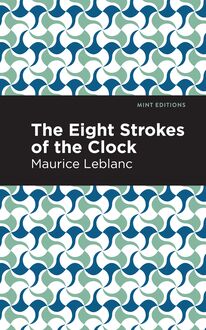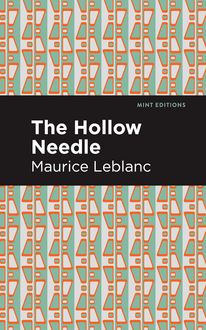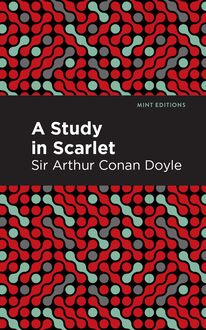-
 Univers
Univers
-
 Ebooks
Ebooks
-
 Livres audio
Livres audio
-
 Presse
Presse
-
 Podcasts
Podcasts
-
 BD
BD
-
 Documents
Documents
-
- Cours
- Révisions
- Ressources pédagogiques
- Sciences de l’éducation
- Manuels scolaires
- Langues
- Travaux de classe
- Annales de BEP
- Etudes supérieures
- Maternelle et primaire
- Fiches de lecture
- Orientation scolaire
- Méthodologie
- Corrigés de devoir
- Annales d’examens et concours
- Annales du bac
- Annales du brevet
- Rapports de stage
La lecture à portée de main
Vous pourrez modifier la taille du texte de cet ouvrage
Découvre YouScribe en t'inscrivant gratuitement
Je m'inscrisDécouvre YouScribe en t'inscrivant gratuitement
Je m'inscrisEn savoir plus
Vous pourrez modifier la taille du texte de cet ouvrage
En savoir plus

Description
At a local tea shop, a lady journalist encounters a brilliant detective who’s able to decode and solve some of the city’s most complicated crimes. This is a thrilling narrative that hinges on the unique dynamic between its two protagonists.
Polly Burton is a young journalist who stumbles across an elderly man at a London tea shop. She soon discovers his peculiar personality and dazzling intellect. Through a series of conversations, they discuss the city’s most infamous criminal cases. With superior deductive skills, the old man’s able to solve each mystery without leaving the comfort of his chair. Some of the stories featured in this vibrant collection include “The Theft at the English Provident Bank,” “The Fenchurch Street Mystery” and " The Regent's Park Murder."
The Old Man in the Corner is Baroness Orczy’s take on the detective genre, which highlights a quirky and unexpected hero. Fans of Sherlock Holmes will adore these clever stories led by the surprisingly perceptive sleuth.
With an eye-catching new cover, and professionally typeset manuscript, this edition of The Old Man in the Corner is both modern and readable.
Sujets
Informations
| Publié par | Mint Editions |
| Date de parution | 02 mars 2021 |
| Nombre de lectures | 0 |
| EAN13 | 9781513277165 |
| Langue | English |
| Poids de l'ouvrage | 1 Mo |
Informations légales : prix de location à la page 0,0500€. Cette information est donnée uniquement à titre indicatif conformément à la législation en vigueur.
Extrait
The Old Man in the Corner
Baroness Emmuska Orczy
The Old Man in the Corner was first published in 1908.
This edition published by Mint Editions 2021.
ISBN 9781513272160 | E-ISBN 9781513277165
Published by Mint Editions®
minteditionbooks.com
Publishing Director: Jennifer Newens
Design & Production: Rachel Lopez Metzger
Project Manager: Micaela Clark
Typesetting: Westchester Publishing Services
C ONTENTS I . T HE F ENCHURCH S TREET M YSTERY II . A M ILLIONAIRE IN THE D OCK III . H IS D EDUCTION IV . T HE R OBBERY IN P HILLIMORE T ERRACE V . A N IGHT’S A DVENTURE VI . A LL H E K NEW VII . T HE Y ORK M YSTERY VIII . T HE C APITAL C HARGE IX . A B ROKEN- H EARTED W OMAN X . T HE M YSTERIOUS D EATH ON THE U NDERGROUND R AILWAY XI . M R. E RRINGTON XII . T HE L IVERPOOL M YSTERY XIII . A C UNNING R ASCAL XIV . T HE E DINBURGH M YSTERY XV . A T ERRIBLE P LIGHT XVI . “ N ON P ROVEN” XVII . U NDENIABLE F ACTS XVIII . T HE T HEFT AT THE E NGLISH P ROVIDENT B ANK XIX . C ONFLICTING E VIDENCE XX . A N A LIBI XXI . T HE D UBLIN M YSTERY XXII . F ORGERY XXIII . A M EMORABLE D AY XXIV . A N U NPARALLELED O UTRAGE XXV . T HE P RISONER XXVI . A S ENSATION XXVII . T WO B LACKGUARDS XXVIII . T HE R EGENT’S P ARK M URDER XXIX . T HE M OTIVE XXX . F RIENDS XXXI . T HE D E G ENNEVILLE P EERAGE XXXII . A H IGH- B RED G ENTLEMAN XXXIII . T HE L IVING AND THE D EAD XXXIV . T HE M YSTERIOUS D EATH IN P ERCY S TREET XXXV . S UICIDE OR M URDER? XXXVI . T HE E ND
I
T HE F ENCHURCH S TREET M YSTERY
T he man in the corner pushed aside his glass, and leant across the table.
“Mysteries!” he commented. “There is no such thing as a mystery in connection with any crime, provided intelligence is brought to bear upon its investigation.”
Very much astonished Polly Burton looked over the top of her newspaper, and fixed a pair of very severe, coldly inquiring brown eyes upon him.
She had disapproved of the man from the instant when he shuffled across the shop and sat down opposite to her, at the same marble-topped table which already held her large coffee (3d.), her roll and butter (2d.), and plate of tongue (6d.).
Now this particular corner, this very same table, that special view of the magnificent marble hall—known as the Norfolk Street branch of the A ë rated Bread Company’s dep ô ts—were Polly’s own corner, table, and view. Here she had partaken of eleven pennyworth of luncheon and one pennyworth of daily information ever since that glorious never-to-be-forgotten day when she was enrolled on the staff of the Evening Observer (we’ll call it that, if you please), and became a member of that illustrious and world-famed organization known as the British Press.
She was a personality, was Miss Burton of the Evening Observer . Her cards were printed thus:
She had interviewed Miss Ellen Terry and the Bishop of Madagascar, Mr. Seymour Hicks and the Chief Commissioner of Police. She had been present at the last Marlborough House garden party—in the cloak-room, that is to say, where she caught sight of Lady Thingummy’s hat, Miss What-you-may-call’s sunshade, and of various other things modistical or fashionable, all of which were duly described under the heading “Royalty and Dress” in the early afternoon edition of the Evening Observer .
(The article itself is signed M.J.B., and is to be found in the files of that leading halfpennyworth.)
For these reasons—and for various others, too—Polly felt irate with the man in the corner, and told him so with her eyes, as plainly as any pair of brown eyes can speak.
She had been reading an article in the Daily Telegraph . The article was palpitatingly interesting. Had Polly been commenting audibly upon it? Certain it is that the man over there had spoken in direct answer to her thoughts.
She looked at him and frowned; the next moment she smiled. Miss Burton (of the Evening Observer) had a keen sense of humour, which two years’ association with the British Press had not succeeded in destroying, and the appearance of the man was sufficient to tickle the most ultra-morose fancy. Polly thought to herself that she had never seen any one so pale, so thin, with such funny light-coloured hair, brushed very smoothly across the top of a very obviously bald crown. He looked so timid and nervous as he fidgeted incessantly with a piece of string; his long, lean, and trembling fingers tying and untying it into knots of wonderful and complicated proportions.
Having carefully studied every detail of the quaint personality Polly felt more amiable.
“And yet,” she remarked kindly but authoritatively, “this article, in an otherwise well-informed journal, will tell you that, even within the last year, no fewer than six crimes have completely baffled the police, and the perpetrators of them are still at large.”
“Pardon me,” he said gently, “I never for a moment ventured to suggest that there were no mysteries to the police ; I merely remarked that there were none where intelligence was brought to bear upon the investigation of crime.”
“Not even in the Fenchurch Street mystery . I suppose,” she asked sarcastically.
“Least of all in the so-called Fenchurch Street mystery ,” he replied quietly.
Now the Fenchurch Street mystery, as that extraordinary crime had popularly been called, had puzzled—as Polly well knew—the brains of every thinking man and woman for the last twelve months. It had puzzled her not inconsiderably; she had been interested, fascinated; she had studied the case, formed her own theories, thought about it all often and often, had even written one or two letters to the Press on the subject—suggesting, arguing, hinting at possibilities and probabilities, adducing proofs which other amateur detectives were equally ready to refute. The attitude of that timid man in the corner, therefore, was peculiarly exasperating, and she retorted with sarcasm destined to completely annihilate her self-complacent interlocutor.
“What a pity it is, in that case, that you do not offer your priceless services to our misguided though well-meaning police.”
“Isn’t it?” he replied with perfect good-humour. “Well, you know, for one thing I doubt if they would accept them; and in the second place my inclinations and my duty would—were I to become an active member of the detective force—nearly always be in direct conflict. As often as not my sympathies go to the criminal who is clever and astute enough to lead our entire police force by the nose.
“I don’t know how much of the case you remember,” he went on quietly. “It certainly, at first, began even to puzzle me. On the 12th of last December a woman, poorly dressed, but with an unmistakable air of having seen better days, gave information at Scotland Yard of the disappearance of her husband, William Kershaw, of no occupation, and apparently of no fixed abode. She was accompanied by a friend—a fat, oily-looking German—and between them they told a tale which set the police immediately on the move.
“It appears that on the 10th of December, at about three o’clock in the afternoon, Karl M ü ller, the German, called on his friend, William Kershaw, for the purpose of collecting a small debt—some ten pounds or so—which the latter owed him. On arriving at the squalid lodging in Charlotte Street, Fitzroy Square, he found William Kershaw in a wild state of excitement, and his wife in tears. M ü ller attempted to state the object of his visit, but Kershaw, with wild gestures, waved him aside, and—in his own words—flabbergasted him by asking him point-blank for another loan of two pounds, which sum, he declared, would be the means of a speedy fortune for himself and the friend who would help him in his need.
“After a quarter of an hour spent in obscure hints, Kershaw, finding the cautious German obdurate, decided to let him into the secret plan, which, he averred, would place thousands into their hands.”
Instinctively Polly had put down her paper; the mild stranger, with his nervous air and timid, watery eyes, had a peculiar way of telling his tale, which somehow fascinated her.
“I don’t know,” he resumed, “if you remember the story which the German told to the police, and which was corroborated in every detail by the wife or widow. Briefly it was this: Some thirty years previously, Kershaw, then twenty years of age, and a medical student at one of the London hospitals, had a chum named Barker, with whom he roomed, together with another.
“The latter, so it appears, brought home one evening a very considerable sum of money, which he had won on the turf, and the following morning he was found murdered in his bed. Kershaw, fortunately for himself, was able to prove a conclusive alibi ; he had spent the night on duty at the hospital; as for Barker, he had disappeared, that is to say, as far as the police were concerned, but not as far as the watchful eyes of his friend Kershaw were able to spy—at least, so the latter said. Barker very cleverly contrived to get away out of the country, and, after sundry vicissitudes, finally settled down at Vladivostok, in Eastern Siberia, where, under the assumed name of Smethurst, he built up an enormous fortune by trading in furs.
“Now, mind you, every one knows Smethurst, the Siberian millionaire. Kershaw’s story that he had once been called Barker, and had committed a murder thirty years ago, was never proved, was it? I am merely telling you what Kershaw said to his friend the German and to his wife on that memorable afternoon of December the 10th.
“According to him Smethurst had made one gigantic mistake in his clever career—he had on four occasions written to his late friend, William Kershaw. Two of these letters had no bearing on the case, since they were written more than twenty-five years ago, and Kershaw, moreover, had lost them—so he said—long ago. According to him, however, the first of these letters was written when Smethurst, alias Barker, ha
-
 Univers
Univers
-
 Ebooks
Ebooks
-
 Livres audio
Livres audio
-
 Presse
Presse
-
 Podcasts
Podcasts
-
 BD
BD
-
 Documents
Documents
-
Jeunesse
-
Littérature
-
Ressources professionnelles
-
Santé et bien-être
-
Savoirs
-
Education
-
Loisirs et hobbies
-
Art, musique et cinéma
-
Actualité et débat de société
-
Jeunesse
-
Littérature
-
Ressources professionnelles
-
Santé et bien-être
-
Savoirs
-
Education
-
Loisirs et hobbies
-
Art, musique et cinéma
-
Actualité et débat de société
-
Actualités
-
Lifestyle
-
Presse jeunesse
-
Presse professionnelle
-
Pratique
-
Presse sportive
-
Presse internationale
-
Culture & Médias
-
Action et Aventures
-
Science-fiction et Fantasy
-
Société
-
Jeunesse
-
Littérature
-
Ressources professionnelles
-
Santé et bien-être
-
Savoirs
-
Education
-
Loisirs et hobbies
-
Art, musique et cinéma
-
Actualité et débat de société
- Cours
- Révisions
- Ressources pédagogiques
- Sciences de l’éducation
- Manuels scolaires
- Langues
- Travaux de classe
- Annales de BEP
- Etudes supérieures
- Maternelle et primaire
- Fiches de lecture
- Orientation scolaire
- Méthodologie
- Corrigés de devoir
- Annales d’examens et concours
- Annales du bac
- Annales du brevet
- Rapports de stage



